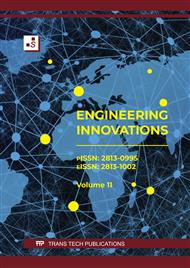[1]
S. Akande, Development of heuristics for single processor scheduling problems with tardiness-related performance measures Statistics 1 (2017).
Google Scholar
[2]
J. Józefowska, Just-in-time scheduling: models and algorithms for computer and manufacturing systems. Springer, USA 2007.
Google Scholar
[3]
T. E. Vollmann, W. L. Berry, and D. C. Whybark, Manufacturing planning and control systems. Irwin/McGraw-Hill. New York, (1997)
Google Scholar
[4]
S. Akande, G.O. Ajisegiri, Three classes of Earliness-Tardiness (E/T) scheduling problems. Fuel Communications, 10, (2022) 1-5.
DOI: 10.1016/j.jfueco.2021.100047
Google Scholar
[5]
F. Kolahan, V. A Kayvanfar, heuristic algorithm approach for scheduling of multi-criteria unrelated parallel machines. World, Academy of Science, Engineering and Technology, 59, (2009). 102.
Google Scholar
[6]
S.Akande, A. E.Oluleye, and E. O. Oyetunji, On the reducibility of multicriteria scheduling problems to bicriteria scheduling problems. 2015 International Conference on Industrial Engineering and Operations Management (IEOM) 1- 8
DOI: 10.1109/ieom.2015.7228107
Google Scholar
[7]
S.Akande, A. E.Oluleye, and E. O. Oyetunji, Reducibility of Some Multi Criteria Scheduling Problems to Bicriteria Scheduling Problems. Proceedings of the 2014 International Conference on Industrial Engineering and Operations Management Bali, Indonesia. (2014).642 - 651.
DOI: 10.1109/ieom.2015.7228107
Google Scholar
[8]
S. Akande, G. O. Ajisegiri, A. A. Adegoke, O. M. Ikumapayi, and T. A Akinlabi, Dispatching Rules For Minimizing Deviation From JIT Schedule Using The Earliness -Tardiness Scheduling Problem With Due Windows Approach. Journal Européen Des Systèmes Automatisés 553 (2022), 377-385.
DOI: 10.18280/jesa.550310
Google Scholar
[9]
N. Mebarki, A. Shahzad, Correlation among tardiness-based measures for scheduling using priority dispatching rules. International Journal of Production Research, 5112(2013), 3688-3697.
DOI: 10.1080/00207543.2012.762131
Google Scholar
[10]
S.French, Sequencing and scheduling, mathematics and its applications. Ellis Horwood Limited, (1982)
Google Scholar
[11]
K. R.Baker, J. J.Kanet, Job shop scheduling with modified due dates. Journal of Operations Management, 41 (1983). 11-22
DOI: 10.1016/0272-6963(83)90022-0
Google Scholar
[12]
K. R. Baker, D. Trietsch, Principles of sequencing and scheduling. John Wiley & Sons. (2013).
Google Scholar
[13]
B. F.Rosa, M. J. F Souza, S. R.de Souza, , M. F.de França Filho, Z Ales, and P. Y. P Michelon, Algorithms for job scheduling problems with distinct time windows and general earliness/tardiness penalties. Computers & Operations Research, 81(2017)., 203-215.
DOI: 10.1016/j.cor.2016.12.024
Google Scholar
[14]
W.-Y Chen,., & G.-J.Sheen, Single-machine scheduling with multiple performance measures: minimizing job-dependent earliness and tardiness subject to the number of tardy jobs. International Journal of Production Economics, 109((2007)), 214-229.
DOI: 10.1016/j.ijpe.2007.01.001
Google Scholar
[15]
D. Biskup, and M. Feldmann, Benchmarks for scheduling on a single machine against restrictive and unrestrictive common due dates. Computers & Operations Research, 288 (2001), 787-801.
DOI: 10.1016/s0305-0548(00)00008-3
Google Scholar
[16]
M. Yazdani, A.Aleti, S. M Khalili, and F. Jolai,. Optimizing the sum of maximum earliness and tardiness of the job shop scheduling problem. Computers & Industrial Engineering, 107(2017)., 12-24.
DOI: 10.1016/j.cie.2017.02.019
Google Scholar
[17]
R. L. Graham, E. L. Lawler, J. K.Lenstra, and A. R.Kan, Optimization and approximation in deterministic sequencing and scheduling: a survey. In Annals of discrete mathematics 5(1979), 287-326.
DOI: 10.1016/s0167-5060(08)70356-x
Google Scholar
[18]
G. A.Süer, X.Yang, O. I Alhawari, J.Santos, & R Vazquez, A genetic algorithm approach for minimizing total tardiness in single machine scheduling. International Journal of Industrial Engineering and Management (IJIEM), 33 (2012) 163-171.
Google Scholar
[19]
I.Sabuncuoglu, & T.Lejmi, Scheduling for non regular performance measure under the due window approach. Omega, 275, (1999). 555-568.
DOI: 10.1016/s0305-0483(99)00018-3
Google Scholar
[20]
S. Akande, A.E. Oluleye, and E.O. Oyetunji, Normalization of composite objective function for multicriteria scheduling problems with zero release dates. Proceedings of the 2015 International Conference on the Challenge of Productivity and National Development, Nigeria Institute of Industrial Engineers. University of Ibadan, Nigeria, (2015) 116-130
DOI: 10.1109/ieom.2015.7228107
Google Scholar


